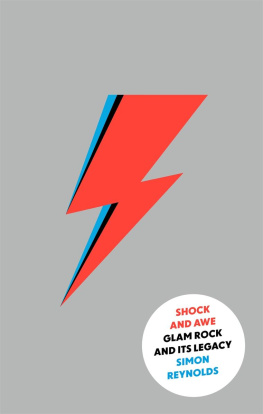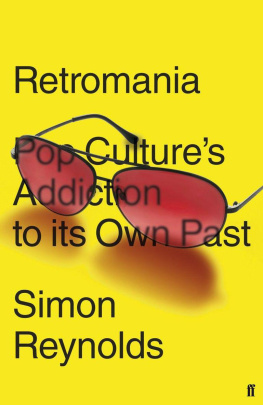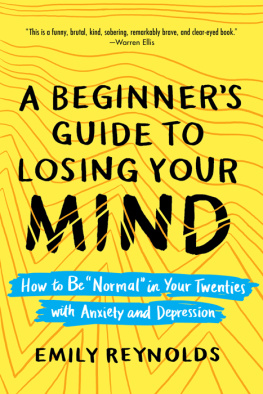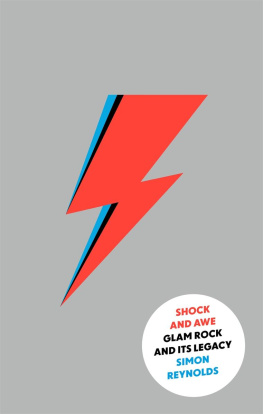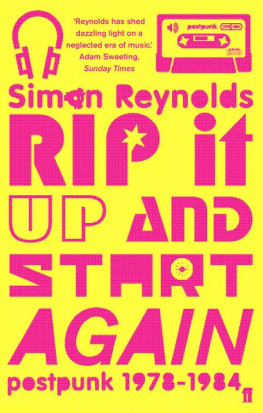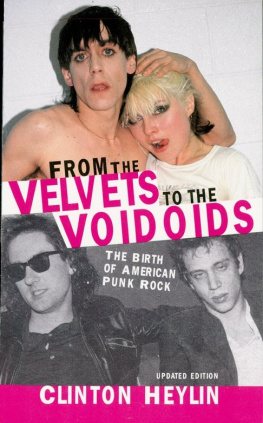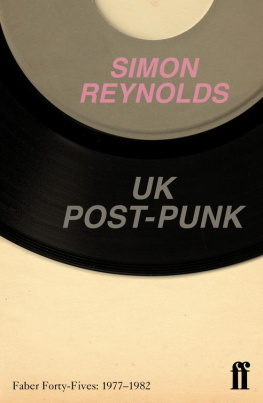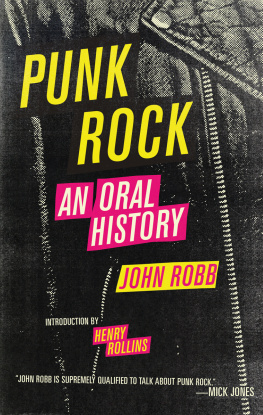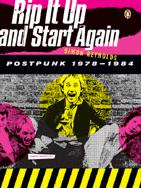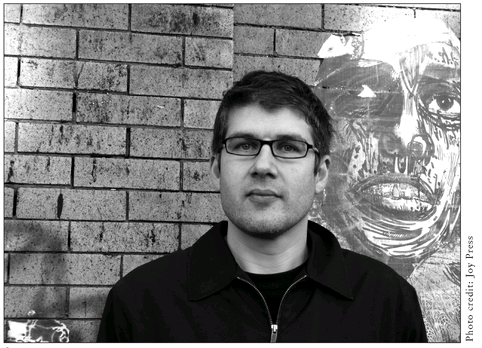Table of Contents
PRAISE FOR SIMON REYNOLDS
If I had to choose just one commentator to guide me through the last quarter-century of popular (and not so popular) music it would have to beon the basis of depth of knowledge, range of reference, soundness of judgment, and fluency of styleSimon Reynolds.
GEOFF DYER
Reynolds writing [is] a perfect alchemy of lightly worn erudition and focused enthusiam.
JESSICA WINTER, Village Voice
... andTotally Wired
A compelling oral history... On every level, Totally Wired is never less than fascinating.
Q
With... Rip It Up and Start Again... Simon Reynolds became the flag-waver for the importance of post-punk to pop music from 1978 to 1984a scene... where The Cure, Echo and the Bunnymen, Public Image Limited and Scritti Politti could exist in the same space simply by sharing the same double-headed ethos of innovation and oddness... [Totally Wired] brings together a collection of people who recall that spirit of possibility so vividly you end up wanting to believe them all... Theres so much to take in and enjoy.
Metro
Reynolds sets about getting to the bottom of what made these people tick creatively, why they made the strange and often magnificent music that they did, and what the social and cultural forces behind that music were... Theres no shortage of laugh-out-loud moments either.
Sunday Business Post
Plenty of entertainment and interest for the post-punk reader.
Mojo
As an interviewer, Reynoldss boyish enthusiam is a joy.
The Wire
Simon Reynolds
TOTALLY WIRED: POST-PUNK INTERVIEWS AND OVERVIEWS
Simon Reynolds is the author of numerous books, including Rip It Up and Start Again: Postpunk 1978-1984 and Generation Ecstasy: Into the World of Techno and Rave Culture. His writing has appeared in The New York Times, Rolling Stone, The Village Voice, Spin, Slate, and Artforum, among other publications. Born in London, Reynolds now lives in Los Angeles.
Also by Simon Reynolds
The Sex Revolts: Gender, Rebellion, and Rock n Roll (with Joy Press) Generation Ecstasy: Into the World of Techno and Rave Culture Rip It Up and Start Again: Postpunk 1978-84 Bring the Noise: 20 Years of Writing about Hip Rock and Hip Hop
To my brother Jez
INTRODUCTION
One of the hardest parts of writing a book is the process of cutting it down: working out what can and should go; being tough enough to actually implement the excisions. With Totally Wired, I got a rare opportunity to undo and restore. Starting out, I thought, Fantastic, this is an authors dream: the chance to put back all the good bits that got thrown out, or at least some of them anyway. This will be fun.
Well, it was enjoyable, but it was also hard work, involving its own set of difficult decisions. Narrowing down to around thirty interviews meant leaving out twice that number that were just as worthy of inclusion. The interviews that made the cut then had themselves to be cut. Nobody - not the reader, not the interviewee, certainly not yours truly the interviewer - would be well served by a verbatim transcript of these dialogues from first utterance to last. Interviews, in my experience on both sides of the mic, emerge gradually out of an amorphous preamble of meandering pleasantry before they find a rhythm. At the other end, they wind down into amiable chit-chat. In between, youll generally get a fair few digressions and dead ends. Overall, theres plenty of redundancy and raggedness that can be discarded with no loss to anybody. In addition to shedding bulk, some of the interviews in this book underwent minor resequencing to eliminate double-backs in the conversation and maintain a more shapely, logical flow. What you get here is the heart of the dialogue, the fruit without the peel or pips.
Focused on a single persons journey through the post-punk period, these interviews supply a more richly detailed picture of the biographic arc of the exceptional individuals who make up Rip It Ups cast. Theres a stronger sense of them as human agents with back stories and backgrounds; products of a place and a time, yet also self-created beings, fantasists and adventurers who pursued their dreams and sometimes, against the odds, realized them. The end result is, I hope, something that can be taken as a companion volume to Rip It Up and Start Again but that works just as well as a freestanding book in its own right.
Totally Wired actually comes in two parts. The much larger first section collates the aforementioned conversations with some of the key figures - and best talkers - of the post-punk era. The smaller second section gathers my own further thoughts and conclusions about the period. In a sense, Totally Wired breaks down into its constituents what was gelled as one in Rip It Up. First, the human-interest stories of the stars of the show: musicians, label founders, producers, journalists. Second, my theories, interpretations, speculations, memories. Some of these take the form of case studies (pieces on the absolutely pivotal bands Public Image Ltd and Joy Division) and others are genealogies of scenes and currents-of-ideas: No Wave and mutant disco New York, the art-rock tradition of non-musician conceptualists from Brian Eno to Malcolm McLaren. Theres also a final transcript: a megamix of my overarching ideas about post-punk that draws heavily from the numerous interviews I did around Rip It Up. Books continue to write themselves in your head long after the official end of the project; the ideas keep coming, whether unprompted or catalysed by interviewers. The larger themes, the significance of the work, even ones motives and goals all become much clearer once its done; lifting your gaze from the immersive graft of research, writing, rewriting, you suddenly see the wood for the trees. You also become painfully aware of all the stuff you forgot to deal with, all those too-obvious-to-need-saying things that really ought to have been pinpointed in crystal clarity because theyre not obvious unless you actually lived through the period in question. So I do feel blessed to have this opportunity to return to the subject.
Maybe all that seems a little obsessive-compulsive, yet I honestly dont think that these two chunky books come close to exhausting the subject of post-punk. There are still many stories untold, still plenty of areas that have just glancingly been touched upon in Rip It Up and Totally Wired. The musical epoch of 1978-84 has a long way to go before it is mapped out as thoroughly as the sixties, or indeed as punk rock itself. All the signs indicate that post-punk is set to be a booming field for investigation and analysis by critics, historians and academics for some time to come. Chronicles of specific scenes, biographies of particular bands, even monographs on individual albums continue to come forth in a steady flow. And you know, I couldnt even say for sure that I personally have run out of things to say about this remarkable period of music and culture. But this will certainly do for now.





